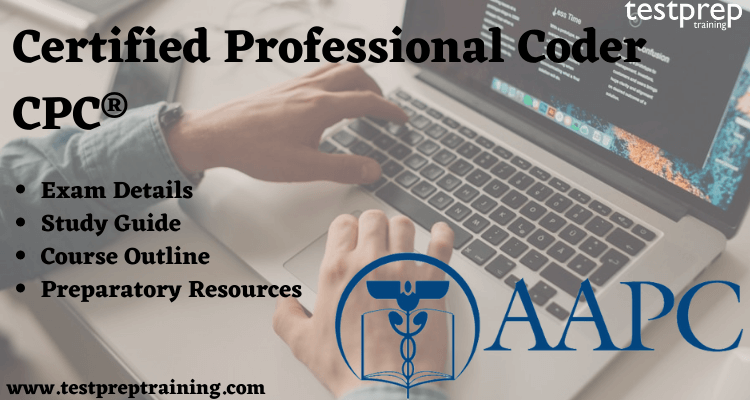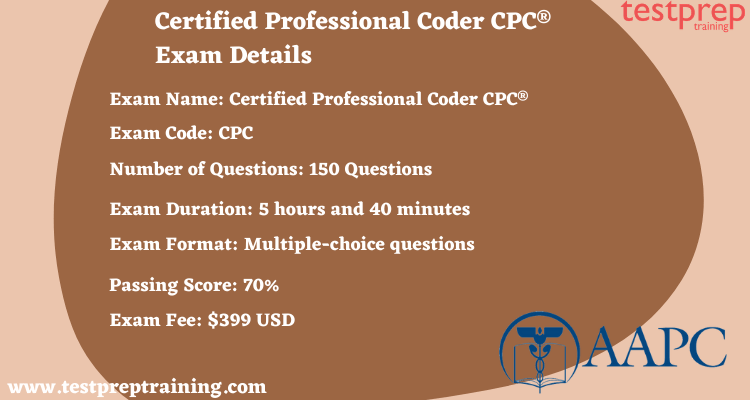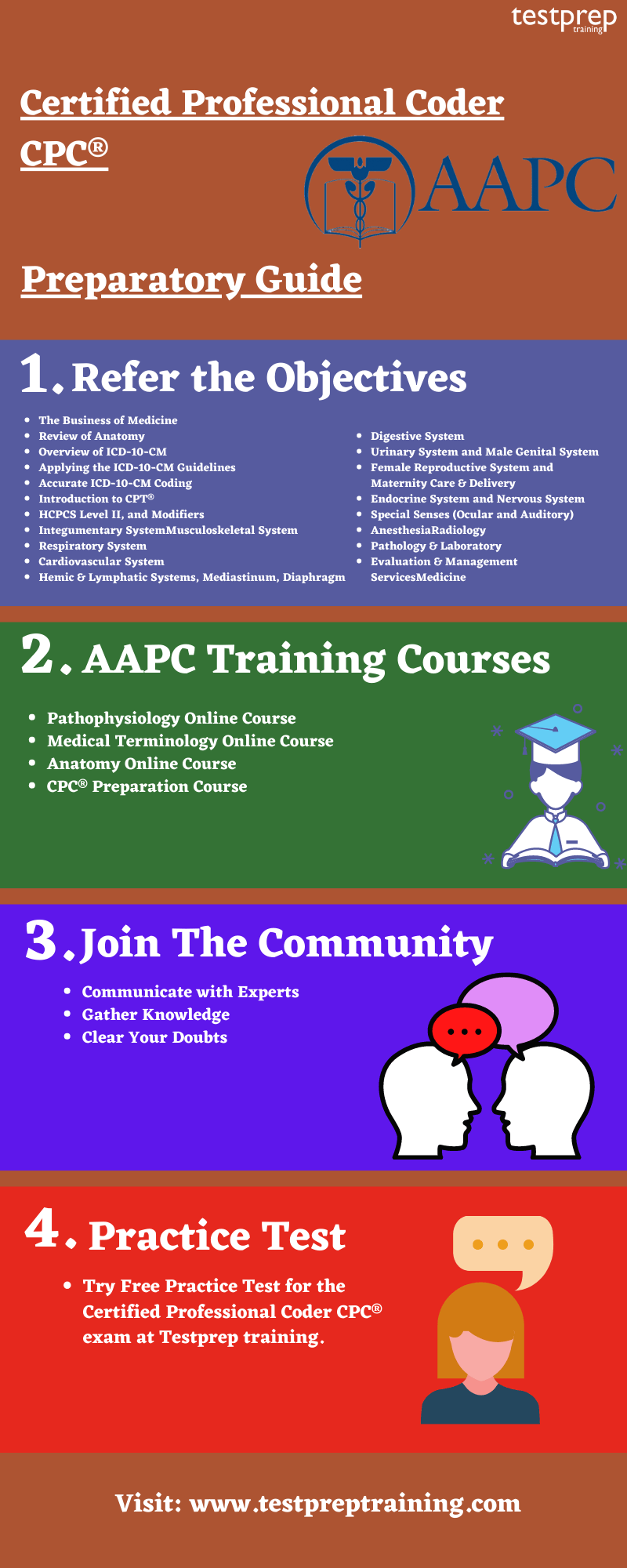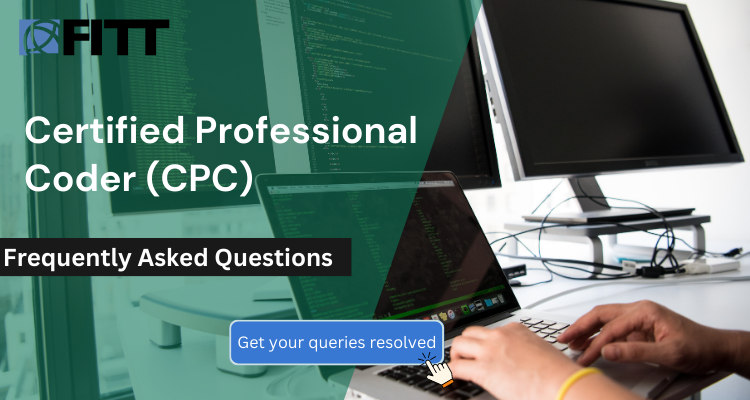Certified Professional Coder CPC®

The Certified Professional Coder (CPC) exam is the conclusive step to attaining CPC certification—renowned throughout the world of healthcare as the gold standard for physician-based medical coding. Bypassing the Certified Professional Coder CPC® exam and earning the right to append the CPC acronym to your name, you become a healthcare business professional recognized for reliable mastery of professional-fee medical coding. Medical Coding is the transformation of healthcare diagnosis, medical services, and types of equipment into universal medical alphanumeric codes. Coding tells what the patient’s problem and what you did for them.
Passing the CPC exam unequivocally demonstrates to employers that you possess:
- Expertise in assigning accurate medical codes for diagnoses, procedures, and services performed by physicians and other qualified healthcare providers in the office, as well as professional-fee coding as it pertains to facility settings (e.g., inpatient hospital)
- Sound knowledge of coding guidelines and regulations to meet compliance requirements, such as establishing medical necessity, using modifiers appropriately, and observing bundling rules
- Proficiency across a wide range of services, including E/M, anesthesia, surgery, radiology, pathology, and medicine
- A thorough grasp of anatomy, physiology, and medical terminology to comprehend clinical documentation and code descriptors
- Understanding of how to integrate medical coding and payment policy changes into a practice’s reimbursement processes.
Who Should Take the CPC Exam?
After you’ve trained with AAPC to become a medical coder—or if you have substantial medical coding experience—you should take the opportunity to gain certification by registering for the Certified Professional Coder CPC test. Passing the CPC exam elevates your earning potential by more than $25,000 above annual salaries for persons without AAPC’s medical coding certification. And CPC salaries, averaging $57,201 in 2019, maintain a 9% increase each year. What’s more, the demand for certified medical coders continues to grow, with a 22% rise in jobs projected by 2022.
Exam Details
The Certified Professional Coder CPC® exam is a test of medical coding proficiency consisting of 150 multiple-choice questions that assess 17 areas of knowledge. You must complete the CPC exam within 5 hours and 40 minutes and answer 70% of the questions correctly to pass. The for the Certified Professional Coder CPC® exam is $399 USD.

Education Requirements
To earn the Certified Professional Coder CPC® credential, you must demonstrate:
- Proficiency across a range of services (including evaluation and management, anesthesia, surgery, radiology, pathology, and medicine);
- Sound knowledge of medical coding guidelines and regulations;
- Mastery of anatomy, physiology, and medical terminology necessary to code correctly diagnosis and services; and
- An understanding of how to integrate medical coding and payment policy changes into reimbursement processes.
Course Outline: Certified Professional Coder CPC®
Passing the Certified Professional Coder (CPC) certification exam requires you to correctly answer a minimum of 105 questions from the series below. The exam questions, however, will not be identified or sorted by the series to which they pertain. The Certified Professional Coder CPC® test will rely on a level of understanding that enables you to identify the series.
- The Business of Medicine
- Review of Anatomy
- Overview of ICD-10-CM
- Applying the ICD-10-CM Guidelines
- Accurate ICD-10-CM Coding
- Introduction to CPT®
- HCPCS Level II, and Modifiers
- Integumentary System
- Musculoskeletal System
- Respiratory System
- Cardiovascular System
- Hemic & Lymphatic Systems, Mediastinum, Diaphragm
- Digestive System
- Urinary System and Male Genital System
- Female Reproductive System and Maternity Care & Delivery
- Endocrine System and Nervous System
- Special Senses (Ocular and Auditory)
- Anesthesia
- Radiology
- Pathology & Laboratory
- Evaluation & Management Services
- Medicine
Course Objectives
- Identify the purpose of the CPT®
- ICD-10-CM, and HCPCS Level II code books
- Understand and apply the official ICD-10-CM coding guidelines
- Apply coding conventions when assigning diagnoses and procedure codes
- Identify the information in appendices of the CPT® codebook
- Explain the determination of the levels of E/M services
- Code a wide variety of patient services using CPT®
- ICD-10-CM, and HCPCS Level II codes
- List the major features of HCPCS Level II codes
- Provide practical application of coding operative reports and evaluation and management services
Certified Professional Coder CPC® FAQ
Exam Policy
After understanding the course outline for the CPC exam, a candidate must visit the official page of the AAPC and try to understand the policies and medical codes of the Certified Professional Coder CPC®. Also, the candidate can visit the Code of Ethics.
Preparatory Guide: Certified Professional Coder CPC

While preparing for any certification or exam, it should be very clear if you know where to begin. Therefore, we at Testprep training have curated a list of all the learning steps and resources which will guide you in a way to succeed and become a Certified Professional Coder.
AAPC Official Website
First of all, you should visit the official website of AAPC because it offers the most reliable information about the exam. AAPC provides a study guide for each of its certifications and exams. The AAPC Certified Professional Coder CPC content is also present on the AAPC website such as all information about medical coding, medical billing, etc. It also includes the objectives and the basic details about the exam.
Official CPC® Certification Study Guide
AAPC’s Official CPC® Certification Study guide is specifically designed to help individuals prepare for the CPC® exam. Twenty chapters will guide you through a review of anatomy and terminology, ICD-10, HCPCS, and CPT® coding for each body system, E/M coding, anesthesia, radiology, pathology/laboratory, and appropriate use of modifiers. This covers all the content sections found on the exam and will also provide you with testing tips for taking the AAPC’s CPC® exam.
The study guide is not an introduction to coding but a review of coding concepts.
Key Features:
- Anatomy and Medical Terminology Review
- Practical Examples
- Testing Techniques for CPC® exam
- Questions designed to mimic the CPC® certification exam
- Each chapter includes ten review questions geared to test important coding concepts
- Study guide was written by the same task force who wrote the CPC® exam
- 200+ Test your Knowledge questions with answers and rationale.
AAPC Training Program
The candidate should get some skills and knowledge provided by AAPC certifications.
How to become a Certified Professional Coder?
In order to get this, firstly, understand the depth and breadth of content covered in the Certified Professional Coder CPC® Exam. It includes:
AAPC’s online pathophysiology course is designed for revenue cycle professionals. Students will review body system anatomy, gain physician insight, and learn pathophysiology for major conditions and diagnostic categories. Quality measures are discussed to tie the science to elements of the revenue cycle. Knowledge of disease processes will be key to keeping pace with the increasing focus on medical decision making and quality measures. This course is developed to help revenue cycle professionals stay ahead of the curve by providing a solid foundation of knowledge in disease process and progression.
Medical Terminology Online Course
Medical terminology is the language spoken in healthcare environments. Understanding medical terminology is essential for efficient communication and operation between physicians, non-clinical staff, and healthcare organizations. For medical coders and billers, job performance depends on fluency in medical terminology.
AAPC’s online anatomy course is ideal for students who have never studied anatomy and physiology or for those who want to improve their knowledge in this area. The course will guide the student along a journey of understanding how the human body operates on a daily basis. This course would be valuable for anyone preparing for a career in any non-clinical medical profession and is strongly recommended for anyone who is taking any AAPC coding or billing course and certification examination.
CPC® Preparation Course
This online Certified Professional Coder CPC® training course teaches fundamental medical coding skills for professional services (physicians, mid-level providers, etc) and prepares the student to take AAPC’s CPC exam. The course is designed to be completed in 4 months, however, AAPC allows for an additional 2 months grace period, giving you a full 6 months of access from the date of purchase. Apart from reading & study time, this course includes approximately 80 clock hours of contact work.
The Certified Professional Coder (CPC) training course covers CPT, HCPCS, and ICD-10-CM coding. Assures a broad knowledge in reviewing and assigning the correct procedure and diagnosis codes for professional (physician) services.
Books and Guides
Maybe, finding the correct study material is a challenging task but the candidate has to learn and explore the correct study material. Books and guides help the candidate to understand the Certified Professional Coder CPC® exam thoroughly. This is one of the most important steps in the preparation guide. AAPC books are mentioned below:
- Medical Coding Books
- ICD-10 Books
- HCPCS Level II Expert 2020
- Medical Coding Book Bundles
Join a Study Group
Joining a group study will also be beneficial for the candidate. It will encourage them to do more hard work. Also, studying in the group will help them to stay connected with the other people who are on the same pathway as them. Also, the discussion of such study groups will benefit the students in their exams.
Try Practice Test
Practice tests are the one who ensures the candidate about their preparation. The Certified Professional Coder (CPC) exam practice test will help the candidates to acknowledge their weak areas so that they can work on them. There are many practice tests available on the internet nowadays, so the candidate can choose which they want. We at Testprep training also offer practice tests which are very helpful for the ones who are preparing.


